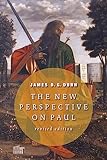The new perspective on Paul / James D.G. Dunn.
Publication details: Grand Rapid, Mich. : W.B. Eerdmans Pub. Co., 2008.Edition: Rev. edDescription: xi, 539 p. ; 24 cmISBN:- 9780802845627
| Item type | Current library | Shelving location | Call number | Status | Date due | Barcode | |
|---|---|---|---|---|---|---|---|
 Books
Books
|
BSOP Library | GC | BS2651 D92n 2008 (Browse shelf(Opens below)) | Available | 00049431 |
Chiefly articles previously published in various sources, 1983-2004.
Includes bibliographical references (p. [493]-506) and indexes.
The new perspective on Paul : whence, what and whither? -- The new perspective on Paul (1983) -- Works of the law and the curse of the law (Gal. 3.10-14) (1985) -- The new perspective on Paul : Paul and the law (1988) -- What was the issue between Paul and "those of the circumcision"? (1991) -- The theology of Galatians : the issue of covenantal nomism (1991) -- The justice of God : a renewed perspective on justification by faith (1991) -- Yet once more : "the works of the law" : a response (1992) -- Echoes of intra-Jewish polemic in Paul's letter to the Galatians (1993) -- How new was Paul's gospel? : the problem of continuity and discontinuity (1994) -- Was Paul against the law? : the law in Galatians and Romans : a test-case of text in context (1995) -- In search of common ground (2001) -- "Neither circumcision nor uncircumcision, but ..." (Gal. 5.2-12; 6.12-16; cf. 1 Cor. 7.17-20) (1996) -- 4QMMT and Galatians (1997) -- Pauls' conversion : a light to twentieth century disputes (1997) -- Paul and justification by faith (1997) -- Whatever happened to "works of the law"? (1998) -- Jesus the judge : further thoughts on Paul's christology and soteriology (2001) -- Noch einmal "works of the law" : the dialogue continues (2002) -- Did Paul have a covenant theology? : reflections on Romans 9.4 and 11.27 (2004) -- Paul and the Torah (2004) -- Philippians 3.2-14 and the new perspective on Paul.
This collection of essays highlights a dimension of Paul's theology of justification that has been neglected -- that his teaching emerged as an integral part of his understanding of his commission to preach the gospel to non-Jews and that his dismissal of justification "by works of the law" was directed not so much against Jewish legalism but rather against his fellow Jews' assumption that the law remained a dividing wall separating Christian Jews from Christian Gentiles. James Dunn seeks to carry forward the debate on Jewish soteriology, on the relation of justification by faith to judgment "according to works," on Christian fulfillment of the law, and on the crucial role of Christ, his death and resurrection. Full of detail and intriguing thought, Dunn's collection will enlighten any scholar of the New Testament.


